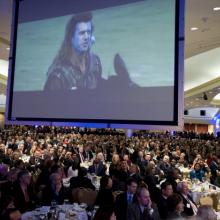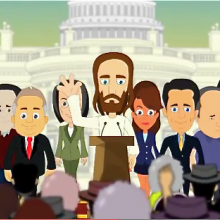Jesus

Pilgrims and tourists pray at the Wailing Wall in Jerusalem. Via Wylio http://bit.ly/wsudSt.
JERUSALEM — Every year, thousands of Americans travel abroad for less-expensive fertility treatments, hip replacements and other medical procedures. Now, an Israel-based tourism company is offering a package that combines medical care with a pilgrimage to the Holy Land.
IsraMedica plans to unveil the initiative Thursday (Feb. 16) at the National Religious Broadcasters convention in Nashville, Tenn.
Eli Knoller, the company's vice president of operations, said IsraMedica already brings about 6,000 nonmedical tourists to Israel every year, the majority of them Christian pilgrims.

"Get Together in the Village." Image via Wylio, http://bit.ly/z9esUG.
"You and I have the power to change someone’s day. And so I am going to challenge you, on this Valentine’s Day, to not only tell family members you love them, but also others whom you care for.
"In a world where people are beat up and put down, God gives us the ability to completely turn negativity, criticism and rude opinions around. “Encourage one another and build each other up,” says 1 Thessalonians 5;11. That is one of the most significant verses in all the Bible because when we do this it sets off a chain reaction of blessing.” You become the voice of God’s mercy and grace in the lives of others."
Everybody has a favorite Whitney Houston song, a memory that makes them stand still and think about how this soulful pop superstar made them feel when they heard her sing.
Remember the chill when she sang the national anthem at the 1991 Super Bowl, or how "I'm Every Woman" empowered women, providing confidence and inspiration?
But anyone who knew Houston understands that her talent came from one place, the God she served at the New Hope Baptist Church in Newark. This is where it all started for its daughter, where she was the darling of the choir as a child who left people speechless, belting out gospel songs and hymns.
What she did through song on Sunday mornings, the members of her home church returned the favor on Sunday (Feb. 12) the only way they know how. They prayed.
They prayed for Emily Cissy Houston, Houston's mother, the minister of music for 54 years at the church.
Ron Williams is the pastor of Church at the GYM in Sanford, Fla. As the Baptist church's name implies, Williams' congregation meets, well, in a gym.
Williams said the goal is to remove the "stained-glass barriers" for people who might not be comfortable in traditional church settings.
"I think all the trappings of traditional religion can make it difficult for people to start coming," he said. "You can invite someone, and they will say, 'I don't have any clothes to wear to church.'"
To make people feel more comfortable, Williams wears jeans. In the warm Florida climate, some members wear shorts. Other clothing types, from urban wear to biker gear, also are welcome.
Sanford native Sandy Adcox, 38, had not been to church in 18 years before she attended Church at the GYM last March. She hasn't missed a service since.
"I've never in my life felt more comfortable in a church," she said. "It's so warm and welcoming."
With all the different groups out there claiming to follow Jesus, how do we know which ones Jesus would claim as his own?
Is it possible that Jesus would claim both liturgical Christians and free-wheeling holy roller Christians?
What about liberal Christians and conservative Christians? Is the tent that Jesus pitches big enough to include people like Dorothy Day and Jerry Falwell?
I’m 33 years old, and I’ve been following Jesus — or should I say trying to follow Jesus — for as long as I can remember. If there’s one thing that I’ve learned after all these years, it’s that as soon as I think that my friends and I have a corner on Jesus, Jesus reminds me that He’s bigger than any organization, doctrine, or philosophical system that I can wrap my brain around.
This past Sunday, Erick Erickson, editor-in-chief of the blog Red State wrote a post titled “The Perversion of the Words of Our Lord Jesus Christ by the Sinner Barack H. Obama."
First, I hope that Erickson remembers that in the Christian tradition calling someone a “sinner” is a theological statement of fact, not a pejorative. Labeling another Christian as a sinner in a bold and brash headline is, I am sure, very gratifying, but it hardly sets one up for an argument based in the teachings of Jesus who came not for the healthy but the sick or Paul who labeled himself the “chief of sinners.”
So, let me get this out of the way. I, Timothy M. King, am a sinner too.
“There is no distance in the Spirit.”
After 30 years as a believer, I experienced the truth of that statement — powerfully and indelibly — in an unlikely place: online.
Like so many of more than 500 million (and growing) members, I signed up for Facebook, the social networking site, a few years ago out of pure curiosity -- to check in with old friends, boyfriends and former colleagues from a safe distance. With its plethora of personal photos, videos and regular “status updates” from members, it was a voyeuristic paradise, not to mention an excellent place to kill time.
I am by vocation a journalist, author and blogger and had grown accustomed to sharing glimpses of my life in print and online. Facebook was just another venue to do that, but little more.
That is, until early one morning in April 2008 when I signed on to my account, wiping sleep from my eyes with coffee in hand, and noticed the status update of a friend from college: “David is really sad that Mark died today.”
Whenever possible, I plan my Saturday errands such that I’ll be able catch part of “This American Life” on public radio as I drive and I’ve often found myself sitting in the grocery store parking lot to hear the end of a story.
One recent Saturday, the show’s theme — which ties together each of its non-fiction stories — was the biblical truism that “you reap what you sow” (Galatians 6:7), and most of the program was dedicated to examining the consequences — intended and otherwise — of Alabama’s controversial, toughest-in-the-nation immigration law, HB 56, which passed last June.
Whether what is happening in Alabama as a result of this law — and, as the program reveals, a great deal is happening, even if most of us outside of the state aren’t paying attention — was the intention of the bill’s authors and supporters is not entirely clear. What is clear, from a Christian perspective, is that the effects are devastating.
What most saddened me in the program was the statement of a young undocumented woman named Gabriella that, since the passage of HB 56, she finds herself unwelcome everywhere. “Even in the church,” she says, “you find people that… don't want to talk at you. And they don't want to give the peace to you.”
Why I Hate Religion, But Love Jesus is a true Internet phenomenon, garnering more than 18 million views and sparking a global debate.
As with most internet phenomena, the viral video has given birth to dozens of similar videos from folks around the world, each adding a different (sometimes serious, sometimes not) perspective to the debates.
Whilst none has had quite the same impact as the original in terms of millions of hits, clicks and media coverage, there are conversation starters aplenty in many of these intriguing (and entertaining) videos.
See a roundup of some of the most interesting responses inside the blog...
“The poor will always be with you,” Jesus once said, and for centuries his followers have struggled to understand what he meant.
Or maybe not.
“The poor will always be with you” — especially if you’re not poor — seems straightforward enough: Look around, people ! The poor (and their problems) are very much with us!
Viewed through this kind of realpolitik lens, this verse (and the Bible generally) pose no real interpretive challenges to our reading or our living. The world, regrettably, is simply thus. The poor, alas, will always be with us.
President Obama connected his faith with his policies toward the poor at the National Prayer Breakfast on Thursday (2/2/12), a subtle but sharp contrast to remarks made by presidential hopeful Mitt Romney the day before.
"Living by the principle that we are our brother's keeper. Caring for the poor and those in need," Obama said before an audience of about 3,000 at the Washington Hilton. These values, he said, "they're the ones that have defined my own faith journey."
Specifically, Obama said, they translate to policies that support research to fight disease and support foreign aid. His faith, he continued, inspires him "to give up some of the tax breaks that I enjoy."
Today I was catching up on emails and came across two messages that deeply affected me, maybe because I read them back-to-back.
The first one is from a friend who helped release the “Collateral Murder” video via Wikileaks, showing US troops shooting some unarmed folks in Baghdad, including two children sitting in a van as their family stopped to pick up the wounded and dead. It is one of the most disturbing and heartbreaking videos I’ve ever seen. Feel free not to watch it.
NOTE: If you do watch the video inside the blog, please know that it is contains vivid images of war. It was released here:
The other email message I read was just the opposite. It was about life.
When our parents teach us at a very young age to say the magic words — please and thank you — they give us our first lessons in morality. Manners are the first step to morality. Etiquette is the first gesture of ethics. Manner and morals derive from the mores of a society. Etiquette derives from the ethos and ethics of a society.
When Arizona Governor Jan Brewer wagged her finger in President Obama’s face upon his arrival in her state, she demonstrated not only a disregard for the Office of the President, but she simply displayed bad manners.
In the United States, we do not have a monarch that embodies the state in his or her person. In the United States, that person is the president of the United States. He and the vice president are the only two elected officials who are elected nationwide. Thus, the president is not only the head of the executive branch of government, but he is the representative of the entire country.
Governor Brewer’s demeanor toward the president was inappropriate. However, the deeper question is why would this woman think it is appropriate to put her finger in anyone’s face, president or not?
What does it mean to be a Christian when organizations such as The Family create a Jesus that does not hear the prayers of the poor? An organization that prays to the powerful in place of God? That participates in the global crucifixion of the poor by turning Jesus' cross into a social ladder for politicians to climb upwards, past the broken body of Christ? To cultivate relationships with dictators?
To cultivate the most powerful for political influence, to create an elite society for the elite, is that listening to the prayers of the people?
I ask you, was Jesus a political networker? Did he hobnob with the most powerful? Did he cultivate relationships with the dictators of his time, Herod and Pilate?
Our political class does not hear the prayers of the poor, they hear the "prayers" of corporate lobbyists who fund their campaigns. And they hear the prayers of Christians such as Doug Coe and The Family at the National Prayer Breakfast, because they offer connections, votes, and money.
The big red barn on my family’s farm was built in the 1880’s.
The wood beams (almost nine feet off the ground), were wide enough for my mom, her siblings and a few other kids from nearby homes to run along. One of their favorite games was a modified sort of dodge ball with one person standing on the barn floor taking aim at the others running on the beams.
It was not safe. But...it was a lot of fun.
As kids ourselves, my brother and I tried to imitate this game in the barn and my mother soon got upset with whichever one of our uncles had told us about it.
My brother and I climbed trees much higher than reasonably advisable and spent hours wandering in the woods unsupervised. During the winter we built “jumps” for sledding runs that were dangerous enough that they routinely spilt blood.
Minor injuries were a regular part of our play. And, it was fun.
As someone who self-identifies as an evangelical Christian, often I begin to feel like the subject of a Discovery Channel documentary, particularly in the midst of a heated presidential election cycle.
It’s Evangelical Week here on Discovery! Travel with us as our explorers track the elusive evangelical in its native habitats. Watch as evangelicals worship, work and play, all captured on film with the latest high definition technology. And follow our intrepid documentary team members as they bravely venture into the most dangerous of exotic evangelical locations — the voting booth!
I understand the interest in us evangelicals, I really do. The way much of the mainstream media covers our communities in the news can make us seem like a puzzling subspecies of the American population, not unlike the Rocky Mountain long-haired yeti.
Are we really that difficult to comprehend?
In a word, yes.
The video will be a satirical take on the Sermon on the Mount with various quotes, signs and policy positions of the Tea Party. While I don’t think the creators of the video would argue that this same test be applied to every piece of legislation Congress considers, it is an interesting experiment.
How often do we divorce the things we say and do or the beliefs we hold from what we read in the Gospels about the person and teachings of Jesus?
This video will drive some conservative Christians nuts for two reasons.
First, because there are conservative Christians, such as Chuck Colson, who have spoken out against Ayn Rand and don’t want to be lumped in with her followers.
Second, because Rand’s influence is real and it’s not a good thing.
Rand’s extreme individualism turns Christian virtue into vice and vice into virtue. Her worldview feeds selfishness and a disregard for our neighbors. I read all 1,046 pages of my paperback copy her Atlas Shrugged and I would like at least 700 pages worth of my time back.

Umair Haque speaking at the 2009 NEXT conference in Berlin. Via Wylio http://bit.ly/AugRQB
If you’re on Twitter, you may well have a few people that you follow with such enthusiasm that it occasionally feels a little like you’re stalking them. You re-tweet every article they post, nod along with every inspiring tweet they type and include them in your Follow Friday list every week.
Even if that’s not true for you, it’s certainly true for me of one person in particular — Umair Haque.
Haque is a self-titled “author, blogger, thinker, reformer.” But the more I read of his work, the more inclined I am to add the title “prophet” to that list of descriptors.
Haque is a prophet in the sense that he is preaching a message that is for a specific group of people (those who are disenfranchised but not quite cynical enough to give up yet) at a specific point in time (now, in a time of economic malaise). His words cut right to the heart of what has been going wrong in our world, and they are words that many, many people need to hear.
So it was with great relish that I purchased his new digital book, Betterness: Economics for Humans, excited to hear these words.
Are you a Christian who spends a lot of time online? Then perhaps you've heard of Jeff Bethke. Bethke, aka bball1989, is a spoken word poet whose rhymes and videos are capturing the attention of thousands of Christians across the web.
His latest video is going viral among online Christian communities. Provocatively titled “Why I Hate Religion, But Love Jesus,” the poem is a unique fusion of prophetic criticism, personal testimony, and a call to action.

"Fulham Warning" via Wylio http://www.wylio.com/credits/Flickr/5682817579
The Great Conversation that we invite our readers to join here at Sojo.net must, by definition, be both civil and respectful. Our comments sections should be a safe harbor, different from the comments sections of any other websites and blogs that deal with the busy intersection of religion, politics and culture.
To that end, during the last few weeks Sojourners staff and management have had a great many discussions about how we might best address the issue of incivility in our comments sections and correct it. We are committed to preserving the comments sections as a vital part of our community and that Great Conversation, but not at the cost of hearts and minds that have been wounded by their experiences here.
We can disagree, and we must when our conscience so demands, but we must do it with kindness, open minds and open hearts.












